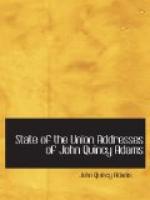This new element of prosperity to that part of our agricultural industry which is occupied in producing the first article of human subsistence is of the most cheering character to the feelings of patriotism. Proceeding from a cause which humanity will view with concern, the sufferings of scarcity in distant lands, it yields a consolatory reflection that this scarcity is in no respect attributable to us; that it comes from the dispensation of Him who ordains all in wisdom and goodness, and who permits evil itself only as an instrument of good; that, far from contributing to this scarcity, our agency will be applied only to the alleviation of its severity, and that in pouring forth from the abundance of our own garners the supplies which will partially restore plenty to those who are in need we shall ourselves reduce our stores and add to the price of our own bread, so as in some degree to participate in the wants which it will be the good fortune of our country to relieve.
The great interests of an agricultural, commercial, and manufacturing nation are so linked in union together that no permanent cause of prosperity to one of them can operate without extending its influence to the others. All these interests are alike under the protecting power of the legislative authority, and the duties of the representative bodies are to conciliate them in harmony together.
So far as the object of taxation is to raise a revenue for discharging the debts and defraying the expenses of the community, its operation should be adapted as much as possible to suit the burden with equal hand upon all in proportion with their ability of bearing it without oppression. But the legislation of one nation is some times intentionally made to bear heavily upon the interests of another. That legislation, adapted, as it is meant to be, to the special interests of its own people, will often press most unequally upon the several component interests of its neighbors.
Thus the legislation of Great Britain, when, as has recently been avowed, adapted to the depression of a rival nation, will naturally abound with regulations to interdict upon the productions of the soil or industry of the other which come in competition with its own, and will present encouragement, perhaps even bounty, to the raw material of the other State which it can not produce itself, and which is essential for the use of its manufactures, competitors in the markets of the world with those of its commercial rival.
Such is the state of commercial legislation of Great Britain as it bears upon our interests. It excludes with interdicting duties all importation (except in time of approaching famine) of the great staple of production of our Middle and Western States; it proscribes with equal rigor the bulkier lumber and live stock of the same portion and also of the Northern and Eastern part of our Union. It refuses even the rice of the South unless aggravated with a charge of duty upon the Northern carrier who brings it to them. But the cotton, indispensable for their looms, they will receive almost duty free to weave it into a fabric for our own wear, to the destruction of our own manufactures, which they are enabled thus to under-sell.




